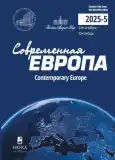The Space Sector of the Baltic-Scandinavian Macroregion: Infrastructure, Potential, and Challenges to Standort Competitiveness
- 作者: Belov V.B1,2,3
-
隶属关系:
- Institute of Europe, Russian Academy of Sciences
- Department for countries researches
- Center for German studies
- 期: 编号 5 (133) (2025)
- 页面: 67-82
- 栏目: PROBLEMS OF ECONOMY
- URL: https://rjsvd.com/0201-7083/article/view/695687
- DOI: https://doi.org/10.31857/S0201708325050067
- ID: 695687
如何引用文章
详细
This article provides a comprehensive analysis of the space sector in the Baltic-Scandinavian Macroregion (BSM). The aim of the study is to assess the level of development, competitiveness, and institutional coherence of BSM as a potential macroregional space – Standort within the European and global contexts. The scope of the analysis includes the industrial supply chains of the rocket and satellite sectors, launch infrastructure (including Esrange, Andoya, SaxaVord, among others), strategic policy documents and government programmes, as well as both civil and military trajectories of space development. The research objectives are as follows: to characterize the geographical scope and composition of the BSM in line with the Standort approach; to provide a structural mapping of key industrial and launch actors; to analyse strategic coordination framework and support mechanisms; to evaluate legal, technological, and institutional challenges and to identify the key factors limiting the region's international competitiveness. The findings suggest that, drawing on its engineering and digital infrastructure, the BSM demonstrates growing potential in the development of small satellite systems and microlaunchers. However, it remains a fragmented, externally dependent, and institutionally unshaped space. Against the backdrop of intensifying global competition and geoeconomic confrontation, this situation requires further coordination among BSM states. If successful, such coordination may, in the medium term, lead to the emergence of a competitive Northern European space Standort.
作者简介
V. Belov
Institute of Europe, Russian Academy of Sciences; Department for countries researches; Center for German studies
Email: belov@instituteofeurope.ru
Candidate of Sciences (Economics), Leading Researcher; Member of Director Board; Chief Moscow, Russia
参考
- Базаркина Д.Ю. (2025) Новая стратегия Европейского космического агентства: спектр технологий для повышения конкурентоспособности в космической сфере. Аналитические записки ИЕ РАН. № 2(42). С. 27‒36. DOI: http://doi.org/10.15211/analytics21420252736
- Белов В.Б. (2024a) Перспективы создания Германией космодрома в Северном море. Научно-аналитический вестник ИЕ РАН. № 4. С. 70–82. doi: 10.15211/vestnikieran420247082
- Белов В.Б. (2024b) Становление Германии как международного космического штандорта. Современная Европа. № 5. С. 21‒35. doi: 10.31857/S0201708324050024
- Гриняев С.Н. (2024) Норвежские вооруженные силы расширяют возможности систем связи в условиях Крайнего Севера. Аналитические записки ИЕ РАН. № 4(40). С. 106‒110. DOI: http://doi.org/10.15211/analytics4362024106110
- Энтина Е.Г. (2023) Методы повышения конкурентоспособности космической деятельности ЕС. Современная Европа. № 7. С. 49–63. DOI: 110.31857/S0201708323070045
- Roland Berger, BDI (2023) Weltraumbeflügeltes Deutschland. 35 p. URL: https://www.rolandberger.com/de/Insights/Publications/Weltraumbefl%C3%BCgeltes-Deutschland.html (дата обращения: 06.06.2025).
- Gatti E., D’Ottavio A. (2025) The Missing Rocket: An Economic and Engineering Analysis of the Reusability Dilemma in the European Space Sector. Intereconomics – Review of European Economic Policy. No. 60(2). P. 88–95. doi: 10.2478/ie-2025-0025
- Pataki Z.G. (2025) EU Capabilities in Space: Scenarios for Space Security by 2050. European Parliamentary Research Service. PE 765.792. 23 p. doi: 10.2861/8152081
- Bartóki-Gönczy B., Malinowska K. (2025) Paradigm shift in the European Union’s space policy: institutional restructuring and its possible consequences for the CEE region. Frontiers in Political Science. No. 7. 1536170. doi: 10.3389/fpos.2025.1536170
- Bartóki-Gönczy B., Sulyok G. (ed.) (2024) The New Space Age: Legal and Policy Perspectives. Ludovika University Press, Budapest, Hungary. 687 p. doi: 10.36250/01208_00
补充文件









